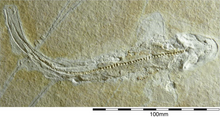Synechodus
| Synechodus Temporal range:
| |
|---|---|

| |
| Skeleton of Synechodus ungeri (JME SOS 3152 B) from the Late Jurassic of Solnhofen, Germany | |

| |
| Tooth of Synechodus dubrisianus | |
| Scientific classification | |
| Domain: | Eukaryota |
| Kingdom: | Animalia |
| Phylum: | Chordata |
| Class: | Chondrichthyes |
| Subclass: | Elasmobranchii |
| Order: | †Synechodontiformes |
| Family: | †Palaeospinacidae |
| Genus: | †Synechodus Woodward, 1888 |
| Type species | |
| Hybodus dubrisiensis Mackie, 1863
| |
Synechodus is an extinct genus of shark belonging to the family Palaeospinacidae and order Synechodontiformes. It is known from 16 species primarily spanning from the Late Triassic to Paleocene.[1] The dentition is multicusped and was used for grasping.[1] Several species are known from skeletal remains, including the species Synechodus ungeri from the Late Jurassic of Germany, which shows that it was relatively short with large pectoral fins and a proportionally large head with a round snout.[1] This species is suggested to have reached a body length of 30–40 centimetres (0.98–1.31 ft).[2] Skeletal remains are also known of the species Synechodus dubrisiensis from the Cretaceous of Europe.[3] A skeleton of an indeterminate species is also known from the Early Cretaceous (Albian) of France, with a body length of around 70 centimetres (2.3 ft).[4] Synechodus is suggested to have had two dorsal fins that lacked fin spines,[5] though the number of dorsal fins is unknown in Synechodus ungeri.[1]
The remains of the oldest known Synecodontiformes from the Early Permian of Russia have been assigned to the genus as the species Synechodus antiquus,[6] though other authors have considered its attribution to the genus doubtful,[7] with other authors considering attribution of all other pre-Jurassic species to genus being questionable.[7][8]
References
[edit]- ^ a b c d Villalobos-Segura, Eduardo; Stumpf, Sebastian; Türtscher, Julia; Jambura, Patrick L.; Begat, Arnaud; López-Romero, Faviel A.; Fischer, Jan; Kriwet, Jürgen (March 2023). "A Synoptic Review of the Cartilaginous Fishes (Chondrichthyes: Holocephali, Elasmobranchii) from the Upper Jurassic Konservat-Lagerstätten of Southern Germany: Taxonomy, Diversity, and Faunal Relationships". Diversity. 15 (3): 386. doi:10.3390/d15030386. ISSN 1424-2818. PMC 7614348. PMID 36950327.
- ^ Klug, Stefanie (2009-06-12). "A new palaeospinacid shark (Chondrichthyes, Neoselachii) from the Upper Jurassic of southern Germany". Journal of Vertebrate Paleontology. 29 (2): 326–335. Bibcode:2009JVPal..29..326K. doi:10.1671/039.029.0203. ISSN 0272-4634. S2CID 130292129.
- ^ Sokolskyi, Tymofii; Guinot, Guillaume (January 2021). "Elasmobranch (Chondrichthyes) assemblages from the Albian (Lower Cretaceous) of Ukraine". Cretaceous Research. 117: 104603. Bibcode:2021CrRes.11704603S. doi:10.1016/j.cretres.2020.104603.
- ^ Mollen, Frederik H.; Hovestadt, Dirk C. (2018-12-20). "A new partial skeleton of a palaeospinacid shark (Neoselachii, Synechodontiformes) from the Albian of northern France, with a review of the taxonomic history of Early Cretaceous species of Synechodus Woodward, 1888". Geodiversitas. 40 (4): 557. doi:10.5252/geodiversitas2018v40a25. ISSN 1280-9659.
- ^ Klug, Stefanie; Kriwet, Jürgen (May 2008). "A new basal galeomorph shark (Synechodontiformes, Neoselachii) from the Early Jurassic of Europe". Naturwissenschaften. 95 (5): 443–448. Bibcode:2008NW.....95..443K. doi:10.1007/s00114-007-0341-0. ISSN 0028-1042. PMID 18196213. S2CID 8460659.
- ^ Ivanov, Alexander (2005-08-30). "Early Permian chondrichthyans of the Middle and South Urals" (PDF). Revista Brasileira de Paleontologia. 8 (2): 127–138. doi:10.4072/rbp.2005.2.05.
- ^ a b Rees, Jan; Campbell, Hamish J.; Simes, John E. (2023-05-21). "The first Triassic elasmobranch teeth from the Southern Hemisphere (Canterbury, New Zealand)". New Zealand Journal of Geology and Geophysics: 1–8. doi:10.1080/00288306.2023.2214369. ISSN 0028-8306. S2CID 258840273.
- ^ Klug, Stefanie; Kriwet, Jürgen (September 2010). "A new Late Jurassic species of the rare synechodontiform shark, Welcommia (Chondrichthyes, Neoselachii)". Paläontologische Zeitschrift. 84 (3): 413–419. Bibcode:2010PalZ...84..413K. doi:10.1007/s12542-010-0058-9. ISSN 0031-0220. S2CID 129213049.
